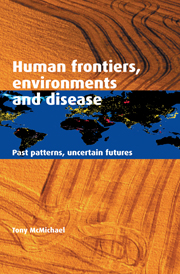Book contents
- Frontmatter
- Contents
- List of sources for illustrations
- Preface
- 1 Disease patterns in human biohistory
- 2 Human biology: the Pleistocene inheritance
- 3 Adapting to diversity: climate, food and infection
- 4 Infectious disease: humans and microbes coevolving
- 5 The Third Horseman: food, farming and famines
- 6 The industrial era: the Fifth Horseman?
- 7 Longer lives and lower birth rates
- 8 Modern affluence: lands of milk and honey
- 9 Cities, social environments and synapses
- 10 Global environmental change: overstepping limits
- 11 Health and disease: an ecological perspective
- 12 Footprints to the future: treading less heavily
- Notes
- Index
2 - Human biology: the Pleistocene inheritance
Published online by Cambridge University Press: 05 March 2012
- Frontmatter
- Contents
- List of sources for illustrations
- Preface
- 1 Disease patterns in human biohistory
- 2 Human biology: the Pleistocene inheritance
- 3 Adapting to diversity: climate, food and infection
- 4 Infectious disease: humans and microbes coevolving
- 5 The Third Horseman: food, farming and famines
- 6 The industrial era: the Fifth Horseman?
- 7 Longer lives and lower birth rates
- 8 Modern affluence: lands of milk and honey
- 9 Cities, social environments and synapses
- 10 Global environmental change: overstepping limits
- 11 Health and disease: an ecological perspective
- 12 Footprints to the future: treading less heavily
- Notes
- Index
Summary
Homo sapiens is the sole survivor in the branching succession of several dozen hominid species. That lineage split off from the ancestral chimpanzee line around 5 million years ago. By 2 million years ago there appear to have been about half a dozen hominid species in Africa. Some were vegetarian australopithecines; others were meat-eating hominines (the early Homo genus). Over most of the ensuing period there were always several Homo species in existence at any time. Until around 30,000 years ago Homo sapiens shared much of Eurasia with its Neanderthal relatives, a separate species. Today, however, all other hominids are extinct.We are the first of the hominid species to exist in isolation. This is a rare situation; natural selection normally fosters within-genus diversity. Our demise would, in a single stroke, eliminate the hominid line from the evolutionary repertoire–along with the hard-won, unique, attributes of complex cerebral consciousness and cumulative culture.
The hominids emerged in response to the profound changes in the cooling, drying climate and environment of eastern and southern Africa as Earth entered the Pliocene epoch, from around 5 million years ago. There were new opportunities for an upright-walking vegetarian primate that could forage in the spreading woodland and savannah, while retreating to the trees in times of danger. Enter the hominids: first the ardipithecines and then, from around 4 million years ago, the australopithecines.
- Type
- Chapter
- Information
- Human Frontiers, Environments and DiseasePast Patterns, Uncertain Futures, pp. 30 - 57Publisher: Cambridge University PressPrint publication year: 2001



